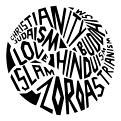
Perennialism is the name of an school of thought which has become popular among some Muslims, especially in the West, this past century. Some of the prominent figures in this school are Rene Guenon, Titus Burckhardt, Martin Lings, Charles le Gai Eaton, Seyyed Hossein Nasr and Frithjof Schuon. (There are other people involved in the larger movement which includes Hindus, Christians, and even some straight-up Fascists, but the above names are the most prominent among those who claimed to be Muslim.)
The basic idea is that there is a single body of truth known as the perennial wisdom which human beings have known from a very early point in history and which gets restated over and over again in the world's major religious traditions. So, for example, Muhammad (saaws), Jesus (as), Krishna, Zoroaster etc. were all basically teaching the same eternal principles, except in a language appropriate to the needs of their audience.
(In some sense this is similar to the Bahai faith which also affirms a belief in the Buddha, Muhammad, Jesus, Zoroaster, Krishna, and others. Although one difference is that the Bahai faith has a notion of "progressive revelation" which develops a time-based hierarchy among the religions. And since the Bahai faith is the most recent, it sits at the top of the hierarchy before those which came before)
You might think this suggests some kind of cafeteria-style spiritual free-for-all but the above names were also part of a movement known as Traditionalism which asserted that this perennial wisdom is best expressed in the traditional, authentically-transmitted, orthodox versions of the various religions. So even if at a very deep level, the various religions agree, it still isn't appropriate to mix and match. Each path should be taken seriously, and followed on its own terms.
So the Perennialists are interesting because, on the one hand, they seem to see a great deal of value in other religions and other civilizations. But on the other hand, they also strive, in their own way, to stay faithful to a particular religious tradition and stay "orthodox".
Some members of the movement, especially in its "Traditionalist" form really emphasize the past and see the modern-age as decadent with things only getting worse. (I have the impression that this is what really motivates the scarier Fascist-Traditionalists)
Mark Sedgewick has a website which goes into a certain amount of depth on Traditionalism and its different manifestations (Actually that first page is an interesting article on the introduction of sufism to the west, but if you go to the homepage you'll find more ino). Sedgwick also has a paper called "Marginal Muslims in Cyberspace"
You can also go to Religio Perennis which is another website which deals with these ideas, but more from an insider's perspective.
And as a counter-balance to give another side of the issue, Dr. Muhammad Legenhausen wrote a piece called "Why I am not a Traditionalist" for a pretty thorough discussion of Traditionalism faults from the point of view of a Muslim who rejects it (rather thoughtfully I should add)
Also at the Living Islam site you can find a page which doesn't deal with these terms head-on but discusses issues in the same ballpark from a critical Islamic perspective.
4 comments:
Perennailism is the same a "The Ancient Wisdom", as it is called by Theosophists. They also like to talk of an Ancient Wisdom Religion.
Really there is no such thing, or there is, but it is something else. What these folk are referring to is the inner soul wisdom we all possess. So yes, this soul wisdom is ancient, but it lives with us today.
And, with respect, I can't see any sense in the quote you have above. Hegemony is a word used by Marxists, and they certainly went ahead and created one. They of course, banned all thoughts and movements that were different from their own narrow views.
The same thing happens in the Gulf States today. Where else in the world do you get your head lopped off in the public square for holding different views?
There are plenty of examples of Islamic hegemony in the world today- enforced by violence.
Freedom from hegemony means freedom to practice your own culture without threat or violence. How many Islamists offer that?
I see countries in the world banning religious practices- and they are Communist and Islamist.
I could go on....
God Bless
I don't think I have any disagreement with your comments on perennialism. Except I wouldn't be wedded to a particular formulation of what the perennial wisdom is like. I wouldn't call myself a Theosophist (or a Perennialist for that matter). But I would tend to think that there is a shared "eternal" body of truths about the meaning of life, etc. which is contained in various religions.
In terms of the rest of your other comments, I'm not a fan of totalitarian Marxist regimes and the quote certainly wasn't intended to give them any kind of support. I also would recognize that many Muslim countries leave something to be desired when it comes to democracy and human rights.
At the same time, Islam has a lot of potential as a kind of "liberation theology". Islam is an important factor in the non-Western world / developing world and can be a counter-balance to Western hegemony.
Online writer and blogger (he focuses on history and eschatology) John Reilly writes a good deal about Perennialism, focusing on its scarier forms, which he calls "esoteric fascism. It's a good site:
www.johnreilly.info
Salaams,
Thanks for the very interesting discussion, which I'm disappointed that I missed when it was first posted.
BTW,you might find this exchange of some interest. http://temporachristiana.wordpress.com/2009/09/08/a-revival-in-liberal-theology
Post a Comment